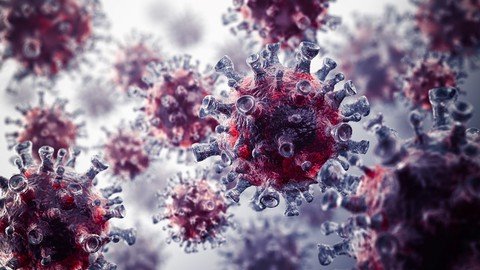
Last updated 4/2022
MP4 | Video: h264, 1280x720 | Audio: AAC, 44.1 KHz
Language: English | Size: 1.24 GB | Duration: 2h 46m
Learn about the structure, genetics, clinical aspects, treatment, and vaccinology of the SARS-Cov-2 and COVID-19
What you'll learn
The definition of viruses
To follow diary cases, deaths and vaccination rates for COVID-19
The structure of SARS-COV-2
The clinical and pathogenic aspects of COVID-19
The proposed treatments for COVID-19
How vaccines for COVID-19 work
A short overview about influenza and HIV
The mechanisms of viral evolution
Requirements
Basic knowledge of biology
Description
Humanity has faced countless pandemics throughout history, and it is still at risk to face future pandemics as humans explore nature and have more contact with wild animals. Respiratory viruses are of particular interest in epidemiological surveillance and the scientific community, since 1) there are many of these viruses in animals that are evolutinarily close to humans; 2) since they are transmitted by the air, their transmissibility potential is far greater than those of other viruses, hence their potential to cause a devastating pandemic!In this course, you'll learn the basic aspects about the SARS-COV-2 and the disease it causes: COVID-19. This is a rapid, short, straight-to-the-point course, where you'll learn about the biological aspects of the SARS-Cov-2, the coronavirus that has been causing the pandemic since the beggining of 2020. In the last section, you'll also learn about other viruses that have potential to cause a pandemic or that are of special interest in the field of virology.In the first chapter of the course, you'll be presented to introductory concepts about viruses, the main types of viruses, how they are transmitted, and introductory concepts about SARS-COV-2. You'll also see some websites to follow the epidemiological situation of SARS-COV-2 across the globe.In Section 2, you'll learn about the structure, replication, interaction with human cells, mechanisms of evolution and the generation of variants, as well as the clinical aspects of SARS-COV-2 and COVID-19.In Section 3, you'll learn about the proposed treatments of the COVID-19 that were investigated in the last two years of intense research.In Section 4, you'll learn about the vaccinology of COVID-19, how the process of vaccine development woks, and which kinds of vaccines are present in most countries to prevent this disease.In Section 5 (extra section), we'll briefly discuss about viruses that are also a matter of concern for public health authorities, like the flu virus and the HIV virus.So... if you meet at least one of the following criteria:1- You want to learn about the basic aspects of Sars-COV-2 virus2- You want to know how to get updated on COVID-19 with respect to cases, deaths and vaccination status3- You want to know how the anti-covid vaccines work and what technologies they use4- You want ot understand the basic aspects of viral evolution and why new variants are formed...then, this course is for you!
Overview
Section 1: Introduction
Lecture 1 Introduction to the course
Lecture 2 What are viruses and the main types of viruses
Lecture 3 What is SARS-Cov-2
Lecture 4 How pandemics are caused: the stages of disease transmission
Lecture 5 Websites to track epidemiological data regarding covid-19
Section 2: The SARS-Cov-2 virus
Lecture 6 The structure of the virus
Lecture 7 The interaction of the virus with human cells
Lecture 8 Viral evolution: mechanisms and variants
Lecture 9 Clinical aspects of the disease
Lecture 10 Observing the RNA of the virus in the NCBI
Lecture 11 Observing the viral protein in the PDB database
Section 3: The COVID-19 treatment
Lecture 12 Drug development: preclinical phase, and phase I and II of clininical studies
Lecture 13 Drug development: phase III and IV of clinical studies
Lecture 14 Drug development: Drug repurposing
Lecture 15 Proposition of chloroquine as a treatment
Lecture 16 Proposition of ivermectin as a treatment
Lecture 17 Proposition of oleandrin as a treatment
Lecture 18 Proposition of dexamethasone as a treatment
Lecture 19 Proposition of antiviral drugs as treatments for COVID-19
Lecture 20 Proposition of antibody-based therapies
Section 4: Vaccinology of COVID-19
Lecture 21 Some principles of immunology: part 1
Lecture 22 Some principles of immunology: part 2
Lecture 23 Introduction to vaccine development: part 1
Lecture 24 Introduction to vaccine development: part 2
Lecture 25 Traditional approaches to vaccine development
Lecture 26 Latest approach: viral vector vaccines
Lecture 27 More recent approaches: mRNA vaccines
Section 5: Other viruses and conclusion
Lecture 28 Influenza virus
Lecture 29 The HIV virus
Lecture 30 Conclusion
Students/professionals of biosciences,Students/professionals of biomedical areas,Students/professionals of chemistry,People interested to know about COVID-19
Homepage
https://www.udemy.com/course/covid-19-an-introductory-course/Fikper
navss.Covid19.An.Introductory.Course.part1.rar.html
navss.Covid19.An.Introductory.Course.part2.rar.html
Rapidgator
navss.Covid19.An.Introductory.Course.part1.rar.html
navss.Covid19.An.Introductory.Course.part2.rar.html
Uploadgig
navss.Covid19.An.Introductory.Course.part1.rar
navss.Covid19.An.Introductory.Course.part2.rar
NitroFlare
navss.Covid19.An.Introductory.Course.part1.rar
navss.Covid19.An.Introductory.Course.part2.rar
Please Help Me Click Connect Icon Below Here and Share News to Social Network | Thanks you !
